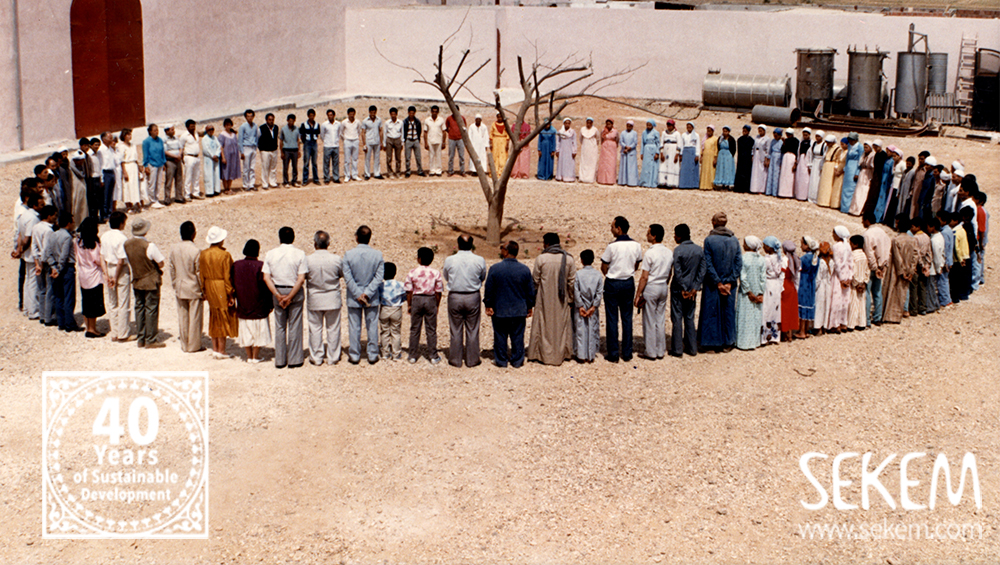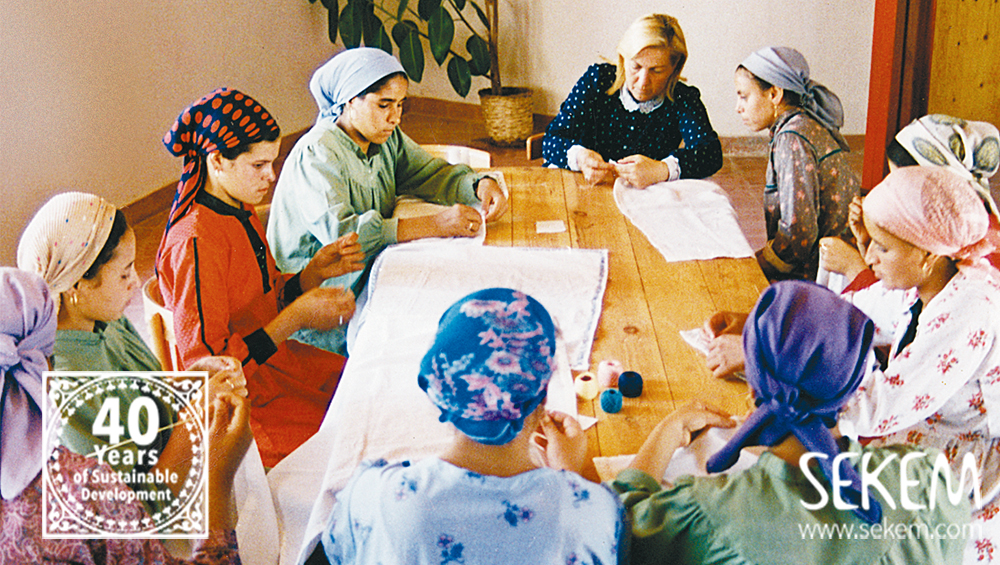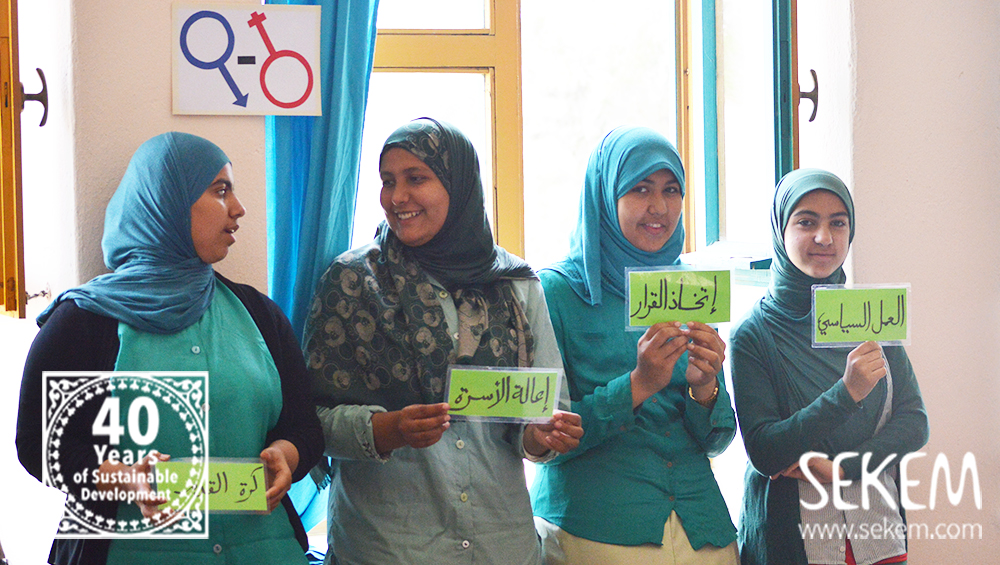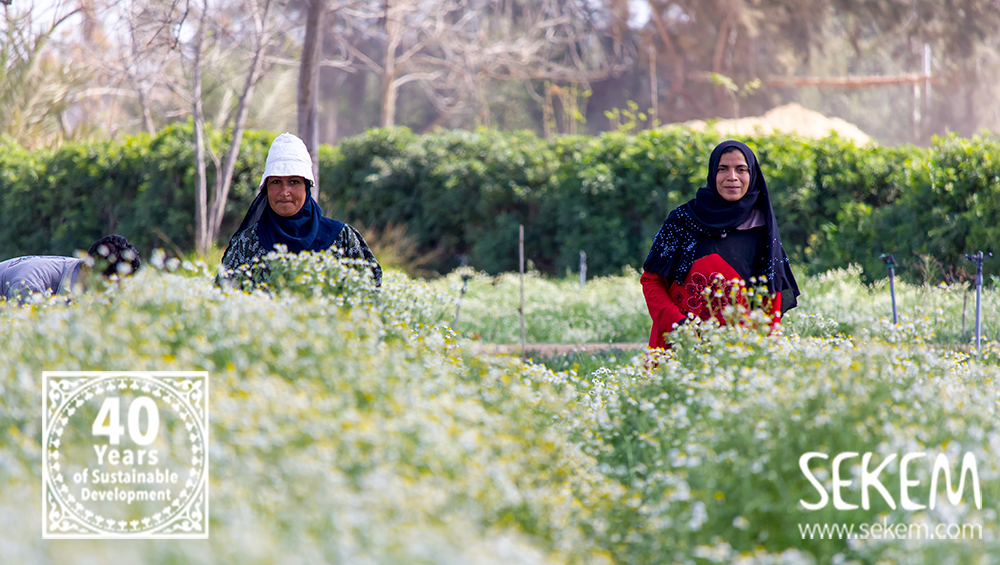Every morning, people in SEKEM gather side-by-side in a circle, speaking influential words and raising the values that unite them. A beautiful picture of equality, which is painted in SEKEM every day, since 1977. Yet, the SEKEM community is continuously working to developing this image, bringing more and more women into the picture, adding more diversity and hence, vividness to it.

“From the very beginning, we never had the problem of female labor shortage,” says Konstanze Abouleish, the Commercial Manager of NatureTex, SEKEMs company for Organic cotton textiles and dolls production. Indeed, the presence of the female co-workers at NatureTex is very prominent, where they weave and knit as well as participate in training sessions and workshops. SEKEM has always been known as a safe and secure work environment for women, despite its establishment in an area surrounded by a male-dominated rural culture. However, out of traditional practices in such regions, SEKEMs female co-workers were quitting their jobs after getting married – a deep-rooted challenge.
“I saw the girls’ growing confidence and persistence,” Konstanze Abouleish, the Commercial Manager of NatureTex
“The year 2011 was the breaker of such resistant challenge”, Konstanze recalls. “I used to be questioned ‘where is the so-called Arab Spring?’ But I really saw the spring coming out there with the girls’ growing confidence and persistence in learning and working, especially after marriage and even after becoming mothers.” It was a slow process, which took years to grow. That process successfully resulted in breaking down outdated traditional patterns hindering the women’s integration. That was obvious, when Konstanze saw that “those female employees, who became pregnant recently, started to reserve a place for their newborn in SEKEMs Nursery already months before delivery.”
Out of that, SEKEM developed more opportunities for its female employees, assisting them to balance between work and family life: flexible working hours, part time jobs, or working from home during the production peaks, for instance. “If we talk about balance and strengthening the female part, we also have to strengthen the male part”, Konstanze asserted. Hence, SEKEM offers a period of maternity leave to new mothers, as well as a paternity leave to new fathers. Additionally, SEKEM provides places for the newborns at the SEKEM Nursery, when their mothers return to work.

2012: Starting point of SEKEM-GIZ cooperation
To foster the economic empowerment of women and their integration into the society even more, SEKEM started cooperating with the German Development Cooperation, GIZ, in 2012. The collaboration started with a GIZ gender-sensitive value chain analysis at NatureTex. Through this, the GIZ recommended the implementation of short and long-term initiatives to promote the integration of women.
A GIZ Development Advisor, Anna Kölling, implemented gender diversity activities in 2014, which reached all SEKEM entities. The German Development Advisor played a crucial role in building a highly competent, well-cultured environment at SEKEM for two years: Next to engaging the SEKEM employees into capacity building activities and offering them medical advisory sessions, SEKEM provided gender equality sessions to the pupils of SEKEM School and Heliopolis University.
The gender efforts are cherished in a new form
The GIZ collaboration was featured in a series of activities held at SEKEM. For instance, holding SEKEMs Girls’ Day, and releasing ‘Al Tanwir Magazine‘ in addition to SEKEMs participation in the film screening campaign ‘Ana Hunna‘. Such activities paved the way for SEKEM to launch its gender strategy for a balanced society in 2015. The strategy fosters a framework of values and provisions that support women. It aims at realizing a community, where all its members have the same chances to make their individual choices concerning their education, work and lifestyle.
SEKEMs gender strategy for a balanced society gained an international recognition: In 2015, SEKEM was granted by the UN Women and World Bank with the “One Business Community, Equal Opportunity Seal”. In the same year SEKEM attended the G7 summit in Berlin, to promote its gender strategy.
“Only visionary organizations that believe in human quality rather than resources are the ones who can handle such revolutionary change,” Basmah Metwally, the first Gender Diversity Officer at SEKEM
“Those who dare to integrate a Gender Diversity management approach are pioneers in the business world. It is a strategic organizational change accompanied by strong resistance and cultural barriers,” says Basmah Metwally. As a matter of realizing sustainability, SEKEM appointed her as Gender Diversity Officer in 2016, after the GIZ Development Advisor successfully smoothed the path. The Egyptian Officer handles and yet promotes all gender activities which take place at SEKEM. “Only visionary organizations, which believe in human quality rather than resources, are the ones who can handle such revolutionary change, and SEKEM is definitely one of those”, the confident Basmah Metwally continues.

Beyond farming
Even on the farming level, SEKEM raised awareness towards gender equality from the early beginnings. “I found it very exciting to work in the desert, to create something out of nothing,” says Angela Hofmann, SEKEMs Agricultural Coordinator and one of the pioneering women, who stepped into SEKEM in the early 1980s. “Being a women in midst of male farmers, while working like them, had a great impact on the farmers towards gender equality since SEKEMs early development],” says the lady, who has been occupying her agricultural leadership position at SEKEM for 35 years.
Economic growth comes hand in hand with gender equality
“The Egyptian economy is in desperate need of qualified personnel – to compete in the global economy, we need to develop the best talents of both males and females,” says Helmy Abouleish. “If we continue to neglect the potential of our 49% female population, this means we miss out on 49% of our nation’s best people”, SEKEMs CEO further explains. This commentary does not only emphasize on how marginalization of women is a deep-seated challenge facing Egypt, but it uncovers the urge of adhering gender equality to the core of business practices in order to achieve economic growth.
The share of SEKEMs total female workforce is about 25%. Although SEKEM has not reached yet the 50/50 balance in its workforce, the percentage is increasing year after year. It is a domino-effect: Raising the awareness towards the female capabilities between the community members and the young ones in particular, will definitely create a balanced and healthy environment: A society able to survive within the fast changing world around, but also able to tackle the challenges facing its development. SEKEM is confident that one day, with the help of its long-standing friends, supporters and of course its members, it will reach this balance in its work environment.
Noha Hussein
A society with two wings: SEKEM celebrates equality
SEKEM presents its commitment to gender equality at G7 Summit
UN Women sponsored an exchange visit at SEKEM
Read SEKEMs Gender Strategy for a Balanced Society

